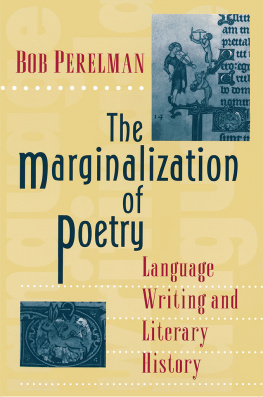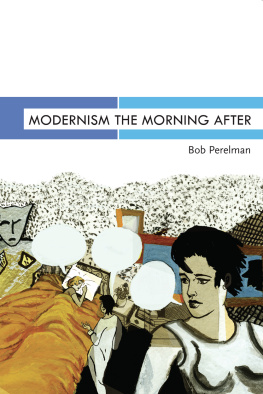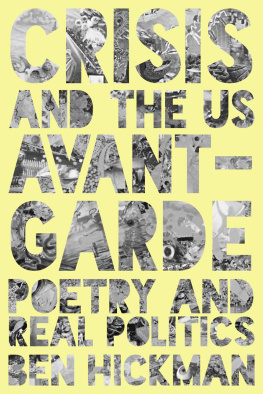THE MARGINALIZATION OF POETRY
BOB PERELMAN
The Marginalization of Poetry
Language Writing and Literary History
PRINCETON UNIVERSITY PRESS, PRINCETON, NEW JERSEY
Copyright 1996 by Princeton University Press
Published by Princeton University Press, 41 William Street, Princeton, New Jersey 08540
In the United Kingdom: Princeton University Press, Chichester, West Sussex
All rights reserved
Library of Congress Cataloging-in-Publication Data
Perelman, Bob.
The marginalization of poetry : language writing and literary history / by Bob Perelman.
p. cm.
Includes index.
ISBN 0-691-02139-2 (CL : alk. paper). ISBN 0-691-02138-4 (PB : alk. paper)
1. American poetry20th centuryHistory and criticismTheory, etc.
2. Language and languages in literature. 3. Poetics. I. Title.
PS325.P37 1996
811.509dc20 95-26685
Permissions
Basil Bunting, Molten pool, incandescent spilth of from Collected Poems 1994 by Basil Bunting, Oxford University Press by permission of Oxford University Press.
Robert Creeley, One thing, As real as thinking, Again from The Collected Poems of Robert Creeley 1982 by Robert Creeley, University of California Press by permission of University of California Press.
Robert Grenier, poems from Sentences 1978 by Robert Grenier, Whale Cloth Press and from What I Believe Transpirationall Transpiring Minnesota 1989 Robert Grenier, O Press by permission of Robert Grenier.
Ted Berrigan, Sonnet 15 from The Sonnets 1964 by Ted Berrigan, Grove Press by permission of Alice Notley.
Lyn Hejinian, Chapter Eighty-Nine from Oxota 1991 by Lyn Hejinian, The Figures Press by permission of The Figures Press.
Rae Armantrout, The Garden, Necromance, from Necromance 1991 by Rae Armantrout, Sun & Moon Press by permission of Sun & Moon Press.
Susan Howe, Thorow from Singularities 1990 by Susan Howe, Wesleyan University Press by permission of University Press of New England.
Frank OHara, The Critic and Heroic Sculpture from Collected Poems by Frank OHara, Copyright 1981 and 1970, respectively, by Maureen Granville-Smith, Administratrix of the Estate of Frank OHara. Reprinted by permission of Alfred A. Knopf, Inc.
Frank OHara, A step away from them Copyright 1964 by Frank OHara. Reprinted by permission of City Lights.
eISBN: 978-0-691-22500-5
R0
ACKNOWLEDGMENTS
In 1990 I left the Bay Area for a job at the University of Pennsylvania. This book reflects that move: my longstanding engagement with language writing will be evident as well as my later involvement with the larger, compartmentalized pastures of the academy.
While I am clearly an interested party, I intend this as a critical book and not simply a celebration or an example of language writing. In places Ive departed from the standard protocols of professional criticism: I would like the formal gestures to register as significant without sacrificing public legibility. Well see.
I have tried to discuss some of the variety of language writing, but I have certainly not succeeded in dealing with or even mentioning many books and writers who deserve intricate response. Here, to reverse a phrase of Marianne Moore, omissions are accidents, deficiencies.
I owe my interest in writing to many writers. Among others, thanks, general and permanent thanks, to Lyn Hejinian, Barrett Watten, Ron Silliman, Carla Harry man, Charles Bernstein, Michael Davidson, Rae Armantrout, Kit Robinson, David Bromige, Robert Grenier, Bruce Andrews, Nate Mackey, Fanny Howe, Tom Mandel, the late Ted Berrigan, Robert Creeley, Michael Palmer, Susan Howe, Steve McCaffery, Leslie Scalapino, Norman Fischer, Jed Rasula, Abigail Child, James Sherry, Ben Friedlander, Jackson Mac Low, Larry Price, Joan Retallack, Peter Middleton, Donald Hall, Rod Smith, Jean Day, the late Jerry Estrin, Geoff Young, Kathleen Fraser, Clark Coolidge, David Melnick, Diane Ward, Eileen Corder, Alan Davies, Laura Moriarty, Erica Hunt, Alan Bernheimer, the late Larry Eigner, Anselm Hollo, Lisa Robertson, Rachel Blau DuPlessis, Susan Stewart, Gil Ott, Julia Blumenreich, Eli Goldblatt, and Noah DeLissovoy.
Specific thanks to Marjorie Perloff, who invited me to give a talk on The Marginalization of Poetry; to Susan Howe, who supplied encouragement, hints, and the word marginalia; to Jim English, who facilitated the pieces original appearance in Postmodern Culture and later in the book Essays in Postmodern Culture, edited by Eyal Amiran and John Unsworth; to James Sherry, whose Roof Press published it as a poem in Virtual Reality, to Peter Baker, who anthologized it in Onward: Contemporary Poetry and Poetics; and to Douglas Messerli, who anthologized it in From the Other Side of the Century: A New American Poetry 1960-90.
To Rod Smith, who published a version of Language Writing and Literary History in the Barrett Watten issue of Aerial. This version also contained versions of the signifying-poems, which here are called An Alphabet of Literary History. To Antoine Caze and Marie-Christine Lemardelay-Cunci, who published a portion of it in the Revue Franaise dEtudes Americaines.
To Peter Stallybrass, Jean-Michel Rabat, Margreta Degrazia, Stuart Curran, Al Filreis, Vicki Mahaffey, Phyllis Rackin, and Michael Ryan, who organized a series of seminars on the book at the University of Pennsylvania. The talk I gave there became Here and Now On Paper.
To Cathy Davidson and Michael Moon, who published a version of Parataxis and Narrative: The New Sentence in Theory and Practice in American Literature; to Jerry Herron, who published it in The Ends of Theory, edited by Jerry Herron, Dorothy Huson, Ross Pudaloff, and Robert Strozier; and to Fredric Jameson, for supplying the original instigation.
To Rita Barnard, Herman Beavers, Dana Phillips, and Craig Saper, for comments on Write the Power; to Gordon Hutner, who published it in American Literary History.
To Tenney Nathanson, who published Building a More Powerful Vocabulary: Bruce Andrews and the World (Trade Center) in The Arizona Quarterly.
To the late Sherman Paul, who published an early portion of This Page Is My Page, This Page Is Your Page: Gender and Mapping in The South Dakota Quarterly.
And to Jean-Michel Rabat, who asked me at the last second to come up with something a little creative for the After Roland Barthes conference organized by him and Craig Saper at the University of Pennsylvania in May 1994.
I also want to acknowledge a fellowship from the MacDowell Colony and a Research Foundation Grant from the University of Pennsylvania.
This book is dedicated to my wife, Francie Shaw; our children, Max and Reuben Perelman; and to the memory of my mother, Evelyn Strassels Perelman.
THE MARGINALIZATION OF POETRY
ONE
The Marginalization of Poetry
If poems are eternal occasions, then
the pre-eternal context for the following
was a panel on The Marginalization
of Poetry at the American Comparative
Literature Conference in San Diego, on
February 8, 1991, at 2:30 P.M.:
The Marginalization of Poetryit almost
goes without saying. Jack Spicer wrote,
No one listens to poetry, but
the question then becomes, who is
Jack Spicer? Poets for whom he
matters would know, and their poems
would be written in a world
in which that line was heard,
though theyd scarcely refer to it.











